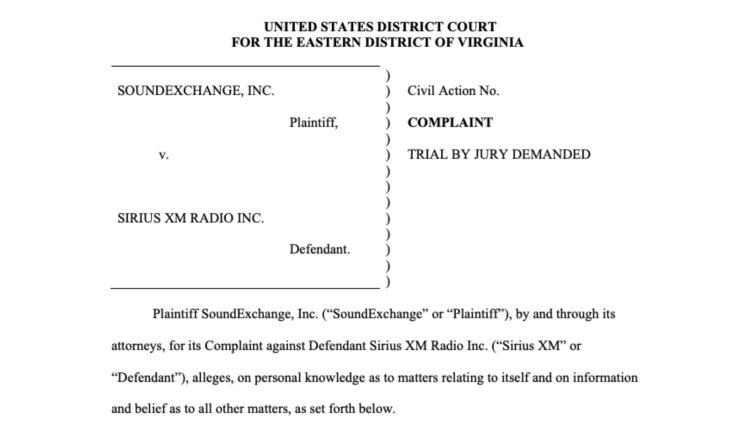SoundExchange Files Lawsuit Against SiriusXM Alleging Unpaid Royalties Worth $150 Million
Performance Rights Organization Seeks to Recover Substantial Overdue Royalties and Late Fees

In a significant legal development that could have far-reaching implications for the music streaming industry, performance rights organization SoundExchange has launched a lawsuit against satellite streaming giant SiriusXM.
The lawsuit, filed on August 16th in the US District Court for the Eastern District of Virginia, alleges that SiriusXM owes "substantial unpaid royalties and late fees" under the Copyright Act, with the amount estimated to exceed $150 million.
SoundExchange, responsible for collecting and distributing royalties to artists and rights holders, claims that SiriusXM has unlawfully withheld these royalties over the past several years.
The heart of the dispute centers around SiriusXM's online streaming service, launched in 2017, which SoundExchange asserts has not been properly compensating recording artists for their creative works.
The organization alleges that SiriusXM has allocated an excessive portion of its revenue to its streaming service rather than its satellite radio service, which has led to an undercounting of owed royalties.
SoundExchange argues that this misallocation has deprived rights holders of their rightful compensation for the use of sound recordings on the streaming platform.
SoundExchange's complaint states, "Sirius XM has exploited the creative efforts of recording artists without paying legally mandated compensation."
The organization further claims that SiriusXM has repeatedly refused to meet its obligations despite ample opportunities to do so, necessitating legal action to recover overdue royalties and late fees.
The lawsuit also draws attention to the distinction in how royalties are calculated for webcasting and satellite radio services.
For webcasting, royalties are determined per play, with a rate of $0.0030 per performance for subscription services and $0.0024 per performance for non-subscription services.
In contrast, satellite radio services lack the ability to determine the exact number of listeners for a particular broadcast, leading to a different royalty calculation system.
This legal dispute could prompt significant changes in the music streaming landscape.
If SoundExchange's claims are substantiated in court, it might pave the way for similar cases against other streaming platforms that may be underpaying royalties to artists and rights holders.
As the lawsuit unfolds, it will be closely watched by musicians, industry stakeholders, and legal experts, all of whom are interested in the outcome's potential impact on the fair compensation of artists in the digital age.
The case could serve as a catalyst for discussions on royalty calculation methods and ensure that the rights and creativity of recording artists are respected and properly compensated in the evolving world of music streaming.
Both SoundExchange and SiriusXM are expected to present their arguments in court as the legal proceedings progress.
The outcome of this lawsuit has the potential to shape the future of royalty distribution in the music industry, ultimately impacting how artists are compensated for their creative contributions in the digital realm.















